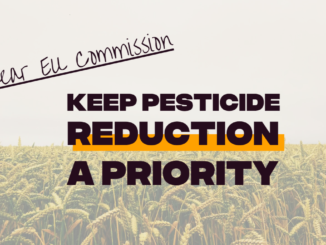
Living and working conditions for banana plantation workers in Cameroon are “appalling” union leader Mbide Kude told ARC2020 in London this week. Mbide speaks for 5,000 members of the FAWU agricultural workers’ union who work on banana plantations across the country. He was in Europe on a campaigning trip organised through BananaLink.
Bananas are the fifth largest export earner for Cameroon, paying hopelessly inadequate wages to 15,000 workers, many of whom work for the Cameroon Development Corporation (CDC). Despite being a major food exporter to neighbouring states, Cameroon has the lowest national monthly wage of 28,000 Central African Francs (CFA), compared to CFA 70,000 in the Central African Republic or CFA 150,000 in Gabone, explains Mbide. “A worker needs to earn CFA 100,000 a month to be able to support a family,” he adds.
The 2006 decision to phase out EU tariffs on so-called “dollar bananas” means that African, Caribbean, and Pacific (ACP) countries such as Cameroon face increasingly strong price competition from Latin American fruit. In 2010, the EU agreed an assistance package worth EUR 190 million for 10 ACP banana producers to help them prepare for the transition. This four-year programme ends in 2013.
The Bananas Accompanying Measures (BAM) were presented as a way of helping ACP countries to reduce the poverty and abuse of the workforce. In June this year, Dutch MEP Thijs Berman asked the European Commission what happened to the EUR 48 million share of BAM funding allocated to Cameroon.
Berman reminded the Commission that: “The major Cameroonian banana producers have repeatedly been accused of human rights violations, of exploiting their workers by forcing them to work long hours for low wages, of exposing them and the local population to pesticides and of taking the land of local owners to expand their plantations.” The working conditions of Cameroonian plantation workers have been documented by BananaLink.
Berman went on to ask what steps the Commission had taken to ensure that the money did not get diverted into continuing abuses of the workforce. The Commission responded by saying that in January 2012, it: “…communicated guidelines for the programming phase of the Bananas Accompanying Measures (BAM) to EU Delegations.”
The Commission went on the explain that: “Through the BAM, the Commission proposes to support adaptation of targeted ACP countries to the reduced most favoured nation tariffs for imports of bananas. At the same time, the BAM will contribute to reduce poverty, foster sustainable growth and ensure the countries’ smooth integration into the world economy. One of the priorities is to focus on the broader impacts generated by the adaptation process related (but not restricted) to employment, social services, and environmental issues, particularly in local communities and the most vulnerable groups.”
Video interviews shot by Jan Nimmo for the BananaLink website document the continuing misery of a workforce that is routinely sprayed alongside the crops the chemicals were purchased to treat.
Mbide has yet to see a centime of EU funding doing anything for his membership. “None of the banana companies are talking about where the EU money has gone,” he explains.
The basic needs of his community include the provision of medicines for the two clinics, better transport and protective clothing for plantation workers spraying crops. “There are two clinics and one doctor,” Mbide continues. But even after the CDC-funded medic referred a plantation worker to the hospital in Douala for chronic symptoms of pesticide poisoning, the toxic effects of crop treatments have never acknowledged by CDC.
Bananas are the most heavily-sprayed food crop in the world. Plantation workers across Africa and Latin America routinely find themselves being sprayed by crop duster planes. While many take shelter under banana leaves, there are often people crossing plantations, some of them carrying uncovered foodstuffs, BananaLink co-ordinator Jacqui Mackay recalled.
CDC is a public-private organisation that runs palm oil and banana plantations. Its bananas are marketed in the EU by Del Monte. While there is official talk of increasing Cameroonian production, basic economics suggest that prices would go down as supply increases, while Mdibe knows that workforce misery will increase.





